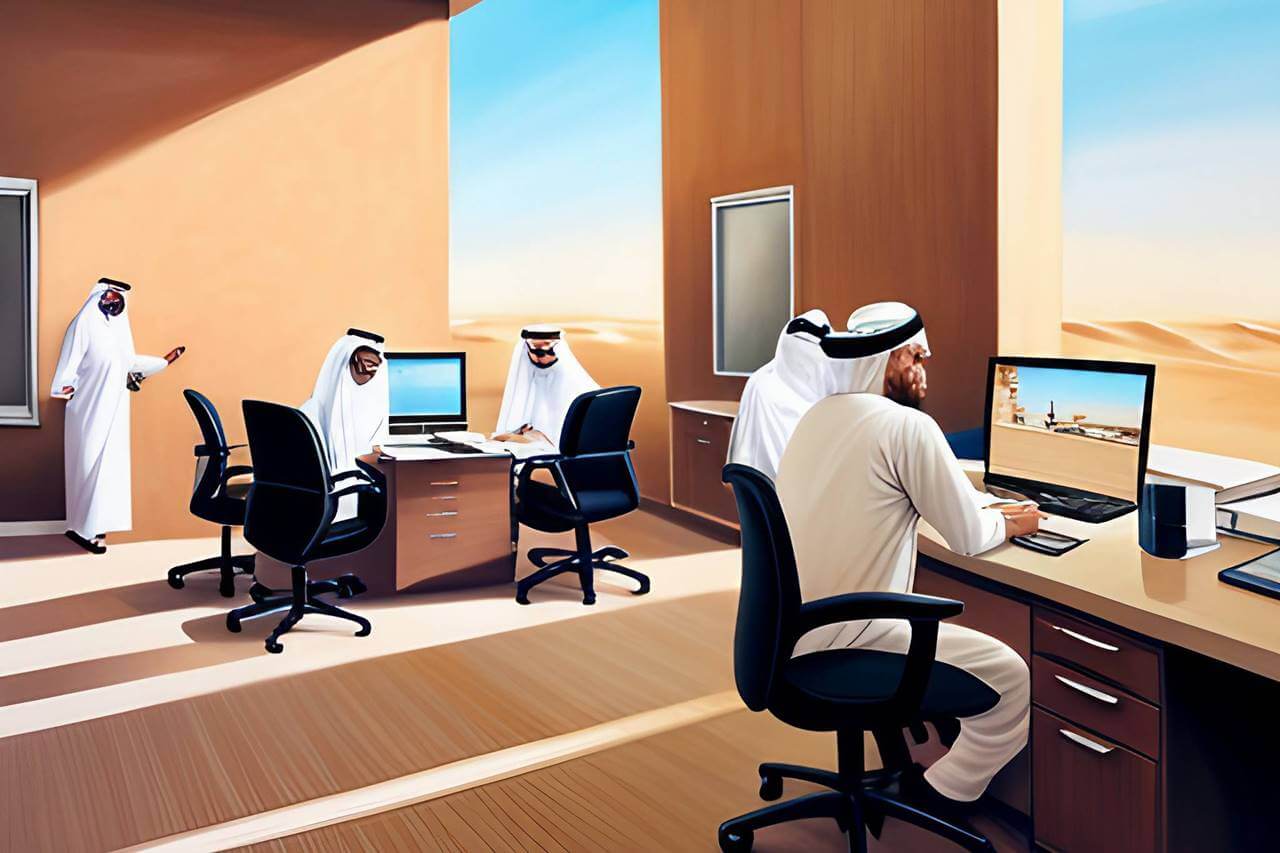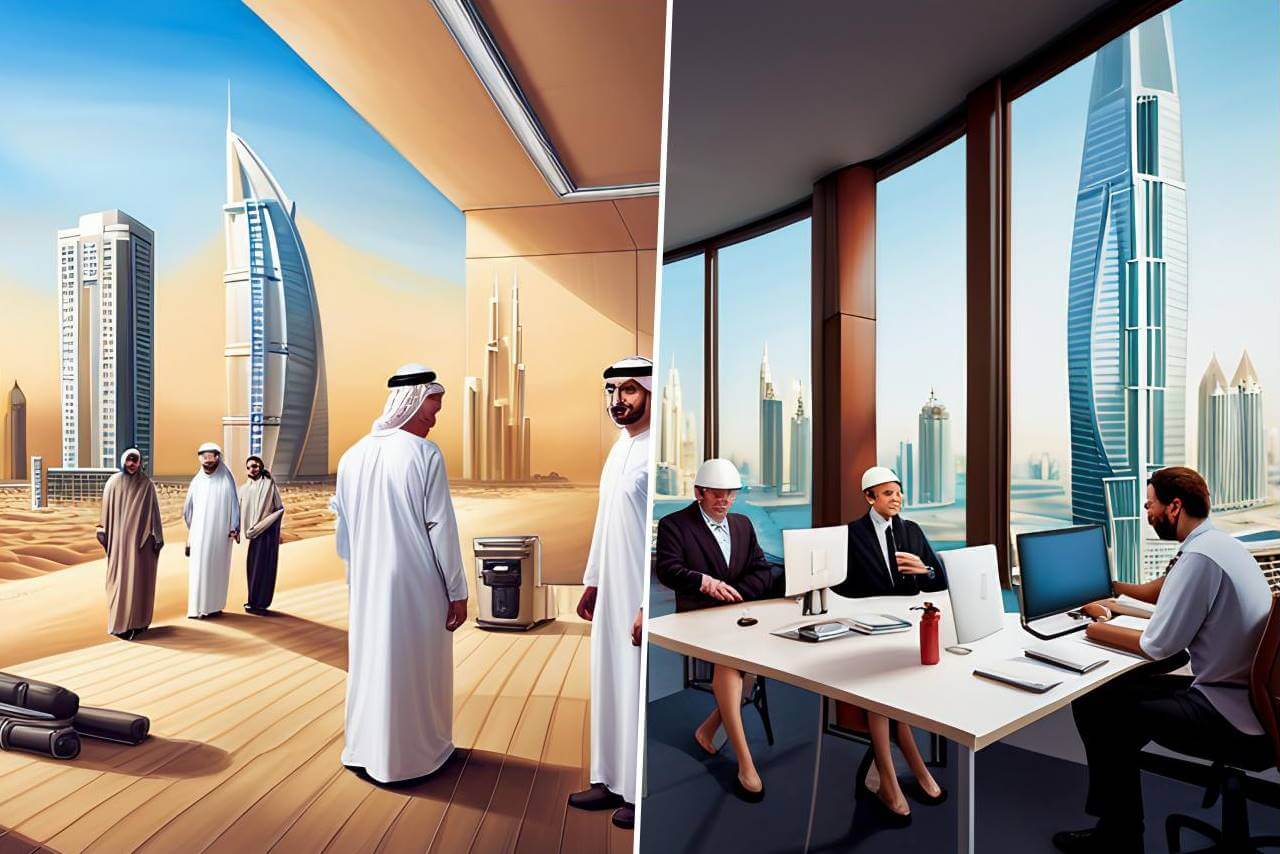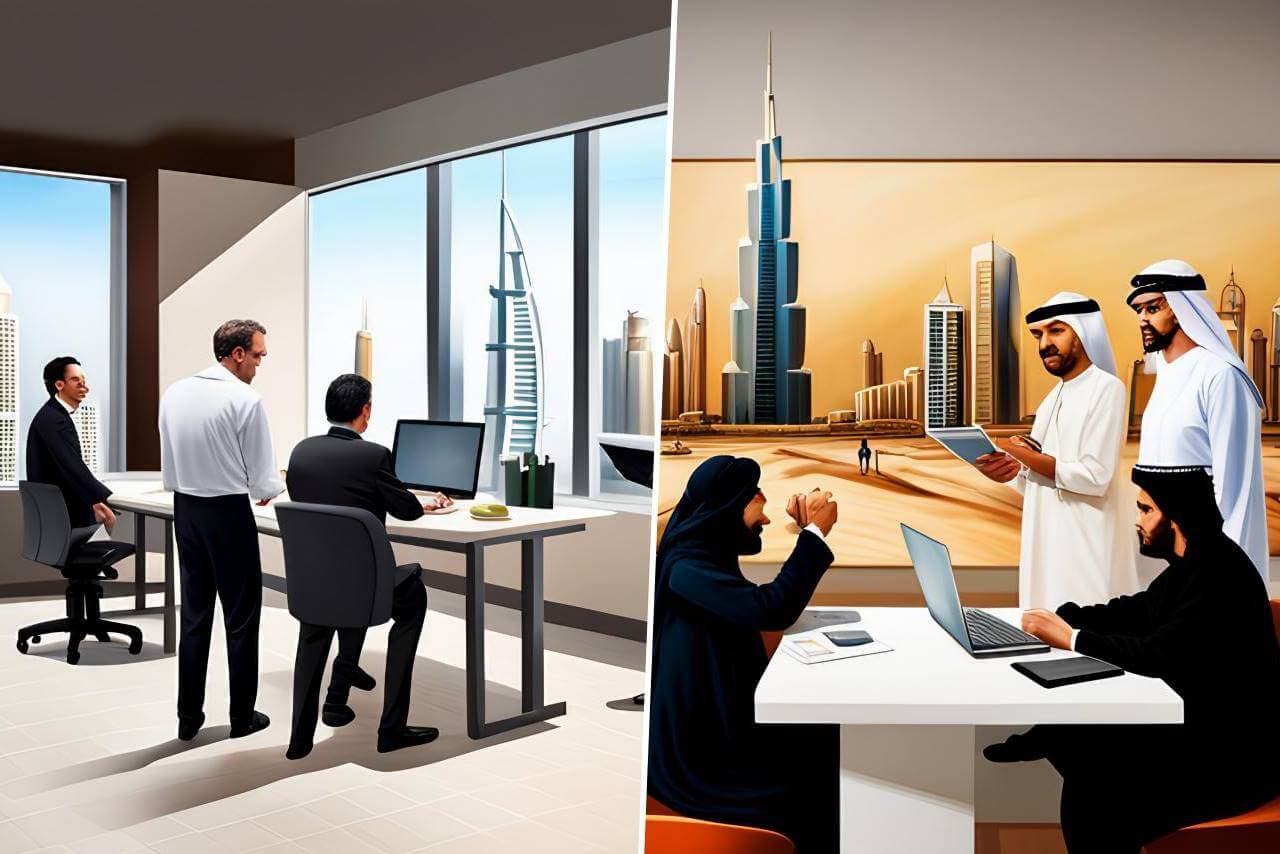Artificial Intelligence (AI) has been rapidly transforming the way we live and work across various industries. As AI technologies continue to improve, they are expected to bring about significant changes in the job market, including in Dubai, a city known for its progressive approach to technology and innovation.
As an expat living in the UAE, it’s important that we stay up-to-date on the potential risks and opportunities that AI may bring for our livelihoods. It’s possible that some jobs in Dubai may be automated, while other roles could be created as a result of new AI technology. There is also a risk of job losses due to some tasks being replaced by machines or algorithms.
But it’s not all bad news. The introduction of AI can create new job opportunities, particularly in areas such as data analysis, machine learning, and software engineering. Additionally, companies will need people to manage AI-based systems, analyze data sets, conduct research into the potential impacts of emerging technologies, and develop strategies for adapting to changing market conditions.
Contents
- List of Job Positions at Risk of Being Replaced by AI in Dubai
- 1. Customer Service Representatives
- 2. Data Entry Operators
- 3. Bank Tellers
- 4. Writers and Copywriters
- 5. Graphic Designers
- 6. Social Media Managers
- 7. Digital Marketers
- 8. PR Specialists
- 9. Human Resources Professionals
- 10. Retail Cashiers
- 11. Drivers
- 12. Salespeople
- 13. Warehouse Workers
- 14. Construction Laborers
- 15. Call Center Operators
- 16. Accountants and Bookkeepers
- 17. Translators and Interpreters
- 18. Manufacturing Workers
- 19. Travel Agents
- Jobs Least Affected by Artificial Intelligence
- Potential Benefits of AI Adoption in Dubai
- Preparing for the Future: How to Stay Relevant in the Age of AI
- Summary

List of Job Positions at Risk of Being Replaced by AI in Dubai
1. Customer Service Representatives
Customer service representatives are responsible for addressing customer inquiries, resolving issues, and providing information about products and services. They often work in call centers, retail stores, or offices and interact with customers via phone, email, or face-to-face.
AI-driven chatbots and virtual assistants can potentially replace customer service representatives in Dubai by handling routine inquiries more efficiently. These AI-powered systems can be available 24/7, providing quick and accurate responses to customer questions. They can also be programmed to handle multiple languages, making them even more versatile in a multicultural city like Dubai.
2. Data Entry Operators
Data entry operators are responsible for inputting data into computer systems, databases, or spreadsheets. They ensure that the information is accurate and up-to-date, and may also perform tasks such as data verification and error correction.
Automated data entry tools powered by AI can process large volumes of data quickly and accurately, potentially making manual data entry jobs obsolete in Dubai. Optical character recognition (OCR) technology, for example, can convert printed or handwritten text into digital data, while machine learning algorithms can identify and correct errors more effectively than humans.
3. Bank Tellers
Bank tellers are responsible for processing customer transactions, such as deposits, withdrawals, and account transfers. They also provide information about banking products and services, and assist customers with various inquiries.
In Dubai, AI-driven financial services and online banking platforms can potentially decrease the demand for human bank tellers. Automated banking kiosks and ATMs can handle routine transactions, while AI-powered chatbots and virtual assistants can provide customers with information about banking products and services.
4. Writers and Copywriters
Writers and copywriters create content for various media, such as articles, reports, and marketing materials. AI-generated content can produce written materials quickly, which could impact writing and copywriting jobs in Dubai. Natural language generation (NLG) tools can create text based on specific guidelines and data inputs, reducing the need for human writers.
5. Graphic Designers
Graphic designers create visual elements, such as logos, images, and layouts, for print and digital media. AI-powered design tools can create visuals and layouts automatically, potentially reducing the demand for human graphic designers in Dubai. AI algorithms can analyze design trends and user preferences, generating designs that are both visually appealing and effective in conveying a message.

6. Social Media Managers
Social media managers are responsible for creating and managing content on social media platforms, as well as monitoring and engaging with users. AI can analyze social media data and automate content posting, which may affect social media management roles in Dubai. AI-driven tools can identify the best times to post content, optimize hashtags, and even generate content ideas based on user engagement data.
7. Digital Marketers
Digital marketers develop and manage online marketing campaigns, using data analysis to optimize results and measure success. AI-driven marketing platforms can optimize campaigns and analyze results, potentially impacting digital marketing jobs in Dubai. AI can identify trends and patterns in user behavior, helping digital marketers to make more informed decisions about targeting, messaging, and budget allocation.
8. PR Specialists
Public relations (PR) specialists are responsible for managing a company’s reputation and building relationships with media outlets. AI tools can monitor media mentions and generate press releases, possibly affecting PR roles in Dubai. AI-driven media monitoring tools can track coverage across a wide range of sources and languages, while natural language generation algorithms can create press materials that are tailored to specific audiences and media outlets.
9. Human Resources Professionals
Human resources professionals are responsible for managing a company’s workforce, including recruitment, employee relations, training and development, and compensation and benefits. They play a critical role in ensuring that the company attracts and retains top talent.
AI-driven HR tools can potentially impact human resources jobs in Dubai by automating various tasks such as candidate screening, resume parsing, and employee performance analysis. AI-powered chatbots can also handle routine employee inquiries, while machine learning algorithms can help identify patterns and trends in employee data to inform HR decisions.
10. Retail Cashiers
Retail cashiers are responsible for processing customer transactions at the point of sale, handling cash and card payments, and providing customer service. They typically work in retail stores, supermarkets, and other customer-facing environments.
In Dubai, AI-driven self-checkout systems and automated payment kiosks can potentially replace human cashiers by allowing customers to complete transactions independently. These systems can process payments more quickly and accurately, reducing the need for human cashiers and improving overall efficiency in retail environments.
11. Drivers
Drivers are responsible for transporting people or goods from one location to another. This includes taxi drivers, truck drivers, and delivery drivers who navigate the roads and ensure the safe and timely delivery of passengers or cargo.
Autonomous vehicles powered by AI have the potential to disrupt the transportation industry in Dubai. Self-driving cars and trucks can navigate traffic, follow routes, and make decisions based on real-time data, potentially replacing human drivers in various driving roles.
12. Salespeople
Salespeople are responsible for selling products and services to customers, either in-person or over the phone. They identify customer needs, provide information about products, and close sales deals.
AI-driven sales tools can analyze customer data and generate personalized sales pitches, which may lessen the need for human sales representatives in Dubai. AI-powered chatbots and sales assistants can provide product recommendations based on customer preferences and purchase history, making the sales process more efficient and targeted.
13. Warehouse Workers
Warehouse workers are responsible for picking, packing, and shipping orders in warehouses and distribution centers. They also perform tasks such as inventory management, loading and unloading trucks, and maintaining warehouse equipment.
AI-controlled robots and automation systems can potentially impact warehouse worker roles in Dubai by performing tasks such as sorting, packing, and shipping more efficiently and accurately. These systems can also work around the clock without breaks, increasing productivity and reducing the need for human labor.
14. Construction Laborers
Construction laborers are responsible for performing a variety of tasks on construction sites, such as digging trenches, mixing concrete, and operating heavy machinery. They work under the supervision of skilled tradespeople and help to build and maintain infrastructure projects.
AI-powered construction equipment and machinery can perform tasks more efficiently and safely in Dubai, potentially reducing the demand for human laborers. For example, AI-controlled bricklaying machines can lay bricks faster and more accurately than humans, while autonomous construction vehicles can perform tasks such as excavation and earthmoving without human intervention.
15. Call Center Operators
Call center operators are responsible for answering customer calls, providing information about products and services, and resolving issues. They often work in large call centers, where they handle a high volume of calls each day.
AI voice assistants can potentially decrease the need for call center operators in Dubai by handling customer calls more efficiently. These AI-powered systems can provide quick and accurate responses to customer inquiries, reducing hold times and increasing overall customer satisfaction.
16. Accountants and Bookkeepers
Accountants and bookkeepers are responsible for managing financial records, preparing financial statements, and ensuring that businesses comply with tax regulations. They analyze financial data, identify trends, and make recommendations based on their findings.
AI-driven accounting software can potentially affect accounting jobs in Dubai by automating tasks such as bookkeeping, tax preparation, and financial reporting. Machine learning algorithms can analyze financial data more quickly and accurately than humans, identifying patterns and making predictions to inform business decisions.
17. Translators and Interpreters
Translators and interpreters convert written or spoken content from one language to another, ensuring that the meaning and context of the original material are preserved. They work in various industries, such as legal, medical, and business settings, where accurate communication is crucial.
AI-powered translation tools can potentially impact translator and interpreter jobs in Dubai by providing real-time translations with increasing accuracy. Machine learning algorithms can analyze vast amounts of linguistic data to improve translation quality, while AI-driven speech recognition technology can enable real-time interpretation during conversations or conferences.
18. Manufacturing Workers
Manufacturing workers are responsible for operating machinery, assembling products, and monitoring production processes in factories and workshops. They play a crucial role in producing goods for various industries, from electronics to automotive manufacturing.
AI-controlled robots and automation systems can potentially replace manufacturing workers in Dubai by performing tasks such as assembly, quality control, and material handling more efficiently and accurately. These AI-powered systems can work around the clock without breaks, increasing productivity and reducing the need for human labor in manufacturing environments.
19. Travel Agents
Travel agents are responsible for planning and booking travel arrangements for clients, including flights, accommodations, transportation, and tours. They provide expert advice and personalized recommendations based on clients’ preferences and budgets.
AI-driven travel booking platforms can potentially impact travel agent jobs in Dubai by automating the process of searching for and booking travel options. AI algorithms can analyze customer preferences and historical data to provide personalized recommendations, while chatbots and virtual assistants can handle customer inquiries and booking requests, reducing the need for human travel agents.

Jobs Least Affected by Artificial Intelligence
While some jobs may be more vulnerable to AI disruption than others, there are certain professions that will likely remain largely unaffected. These include:
1. Surgeons
Surgeons are medical professionals who perform surgical procedures to treat injuries, diseases, and various health conditions. While AI can assist in diagnostics and surgical planning, the expertise, precision, and decision-making abilities of human surgeons remain indispensable for performing complex surgeries and adapting to unexpected situations during operations.
2. Mental Health Professionals
Mental health professionals, such as psychologists and psychiatrists, provide therapy, counseling, and treatment for individuals experiencing mental health issues. Although AI can support these professionals by analyzing data and identifying patterns, the empathetic understanding and human connection provided by mental health professionals are essential for building trust and effectively treating patients.
3. Social Workers
Social workers support individuals, families, and communities facing various challenges, such as poverty, addiction, and mental health issues. They develop intervention plans, connect clients with resources, and advocate for their needs. While AI can help identify at-risk populations and streamline administrative tasks, the compassionate and culturally sensitive support provided by human social workers remains crucial.
4. Teachers and Educators
Teachers and educators play a vital role in imparting knowledge, fostering critical thinking, and nurturing the personal growth of students of all ages. AI can enhance the learning experience by providing personalized learning materials and analyzing student performance data. However, the human touch, guidance, and mentorship provided by teachers and educators remain irreplaceable in fostering a holistic learning environment.

5. Skilled Tradespeople: Carpenders, Plumbers, Electricians
Skilled tradespeople, including electricians, plumbers, and carpenters, possess specialized knowledge and expertise to perform hands-on tasks in their respective fields. AI can assist these professionals with diagnostics, planning, and data analysis. However, the practical skills, experience, and problem-solving abilities of human tradespeople remain essential for performing complex tasks and adapting to real-world challenges.
6. Research Scientists
Research scientists conduct experiments, gather data, and develop theories across various scientific disciplines, such as biology, chemistry, and physics. While AI can analyze vast amounts of data and generate hypotheses, the curiosity, critical thinking, and innovative problem-solving skills of human research scientists are crucial for driving scientific discoveries and breakthroughs.
7. Human Resource Managers
Human resource managers oversee the recruitment, training, and development of a company’s workforce, as well as manage employee relations and organizational culture. Although AI can streamline various HR tasks, such as candidate screening and performance analysis, the emotional intelligence, interpersonal skills, and strategic decision-making abilities of human HR managers remain essential for fostering a positive work environment and managing complex employee issues.
8. Environmental Scientists
Environmental scientists study the natural environment, including its resources, ecosystems, and the effects of human activities on the planet. They develop strategies to mitigate environmental issues, such as climate change and pollution. While AI can help process large datasets and identify patterns, the passion, expertise, and holistic understanding of human environmental scientists are crucial for addressing complex environmental challenges and developing sustainable solutions.
9. Occupational Therapists
Occupational therapists help individuals with physical, mental, or developmental disabilities improve their daily living and working skills. They develop customized treatment plans and provide hands-on therapy to help clients achieve their goals. Although AI can support these professionals with data analysis and treatment planning, the empathetic care, adaptability, and personalized attention provided by human occupational therapists are vital for effective treatment and client progress.
10. Nurses and Healthcare Practitioners
Nurses and other healthcare practitioners provide essential medical services such as diagnosing illnesses, administering medications, performing minor surgeries, and providing patient care. They rely heavily on their knowledge of medicine and human anatomy to diagnose and treat patients effectively.
AI is not yet advanced enough to fully replace nurses and healthcare practitioners in Dubai, as the level of expertise required for these positions cannot be replicated by machines. AI-driven systems can assist with diagnostic tasks or alert clinicians when abnormalities are detected in patient data, but humans will still need to assess the data and make informed decisions
Overall, human expertise is still a valuable asset across many industries in Dubai, including medicine, engineering, technology, education, research and development, tradespeople, HR management, environmental sciences, and occupational therapy.

Potential Benefits of AI Adoption in Dubai
- Increased Efficiency and Productivity: AI can perform tasks faster and more accurately than humans, leading to increased productivity across various industries.
- Creation of New Jobs: While AI may replace some jobs, it can also create new opportunities in fields such as AI development, data analysis, and cybersecurity.
- Improved Quality of Services and Products: AI can enhance the quality of services and products by reducing human errors, streamlining processes, and providing personalized experiences.
Preparing for the Future: How to Stay Relevant in the Age of AI
- Upskilling and Reskilling: Acquiring new skills and updating existing ones can help individuals stay competitive in the job market as AI technologies advance.
- Pursuing Careers in High-Demand Fields: Focusing on careers in AI, data science, and other in-demand fields can increase job security.
- Embracing Lifelong Learning: Continuous learning and staying updated on AI trends can help individuals adapt to the changing job market.
- Building Soft Skills and Emotional Intelligence: Developing skills such as communication, empathy, and teamwork can differentiate humans from AI and enhance their value in the workplace.

Summary
The impact of AI on jobs in Dubai presents both challenges and opportunities. As AI continues to advance, it is crucial for individuals to adapt their skills and embrace lifelong learning to stay relevant in the job market.
By focusing on high-demand fields and building soft skills, individuals can better prepare for the future and thrive in the age of AI.
